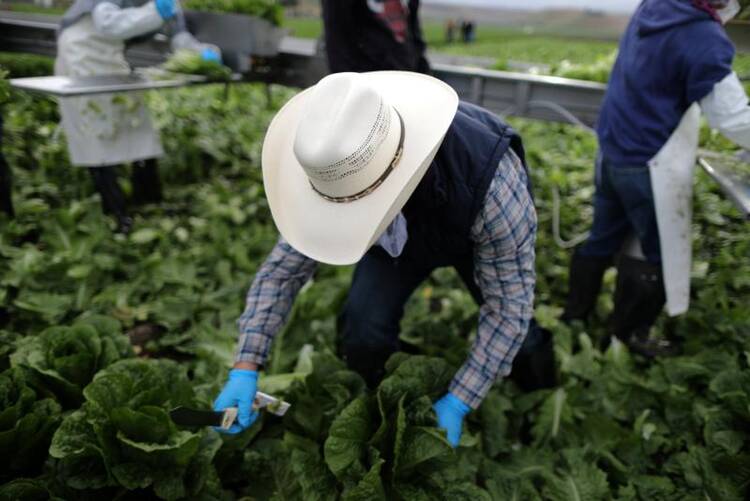WASHINGTON (CNS) -- Four U.S. Catholic bishops called on government officials to consider the role and plight of U.S. migrant farmworkers during the coronavirus pandemic and made recommendations that include free testing and care should the workers test positive for COVID-19, the disease caused by the coronavirus.
"We would like to express our sincere gratitude and prayers for the many essential workers throughout the country, helping us receive our medicines, groceries, and other fundamental needs during this difficult time," the bishops said in the April 29 statement. "We would like to highlight the reality of migrant farmworker communities and honor their heroic role amidst the many challenges they face during this crisis."
The statement was offered on behalf of Archbishop Nelson J. Perez of Philadelphia and chairman of the U.S. Conference of Catholic Bishops' (USCCB) Committee on Cultural Diversity in the Church; Bishop Joseph J. Tyson of Yakima, chairman of the Subcommittee on Pastoral Care of Migrants, Refugees and Travelers (PCMRT); Bishop Oscar Cantu of San Jose, California, and PCMRT's episcopal liaison for migrant farmworker ministry; and Bishop Mario E. Dorsonville, auxiliary bishop of Washington and chairman of the Committee on Migration.
In addition to testing and access to health care, the bishops recommended that housing and transportation for farmworkers comply with current Centers for Disease Control and Prevention guidelines, that workers receive information on proper health and hygiene accessible in multiple languages and infographics for workers who can't read, that employers ensure access to proper hygiene and safety protections at work sites, including hand-washing facilities or stations, and masks or other personal protective equipment.
They also recommended employers "have an emergency health plan in place to ensure care and protocols when a worker contracts the COVID-19 virus."
As they've done in the past, the bishops made a call to "honor the dignity of the work of farmworkers and make sure that they are paid a livable wage," as well as be eligible for other benefits to help protect their health and the health and safety of their families.
They also mentioned that since some of the farmworkers are "undocumented," their immigration status could make them more vulnerable to abuse as some would be reluctant to address overcrowding, lack of social distance in their work, transportation or housing and lack of protective equipment.
The bishops' statement said that "conditions of their immigration visas can make them unwilling or unable to speak out about a need for protection due to the threat of losing their job."
In addition, farmworkers are more susceptible to the economic consequences of the pandemic, they said.
"With disruption and layoffs due to the COVID-19 virus, many farmworkers are finding themselves without income for their families for the foreseeable future, and others who would otherwise stay at home for health concerns are risking going to work during this time as essential workers," the statement said. "Child care for families with school closures is another area of related concern, as families may be at a loss for affordable, viable, safe child care options. The realities of financial instability, increased stress and anxiety during this time may also contribute to an increase in cases of domestic violence and labor exploitation."
However, they said they saw "signs of hope" in the industry as many employers are striving to protect the workers and follow guidelines to keep them safe.
"Because of these many, grave concerns for this community, we urge our political leaders and policymakers to consider the realities and emerging, pressing needs of the farmworker communities across the country during this time of the coronavirus outbreak. To defeat the virus, no one must be left out. The COVID-19 virus teaches us we are one human family, says the Holy Father. "We can only get out of this situation together, as a whole humanity.'"










